外研版选修六Module 4 Music - Grammar课件(29张)
文档属性
| 名称 | 外研版选修六Module 4 Music - Grammar课件(29张) | 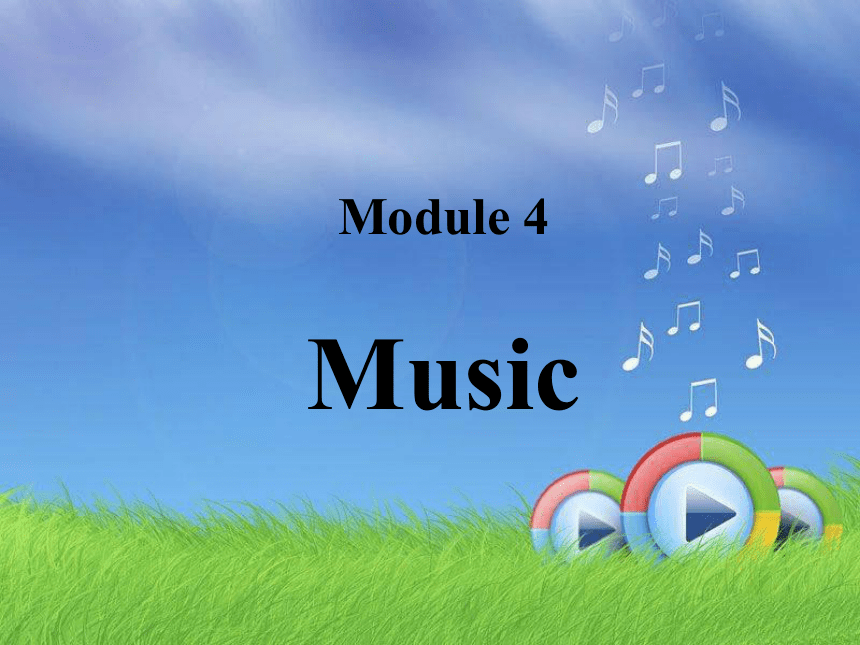 | |
| 格式 | zip | ||
| 文件大小 | 200.0KB | ||
| 资源类型 | 教案 | ||
| 版本资源 | 外研版 | ||
| 科目 | 英语 | ||
| 更新时间 | 2019-07-18 18:36:12 | ||
图片预览

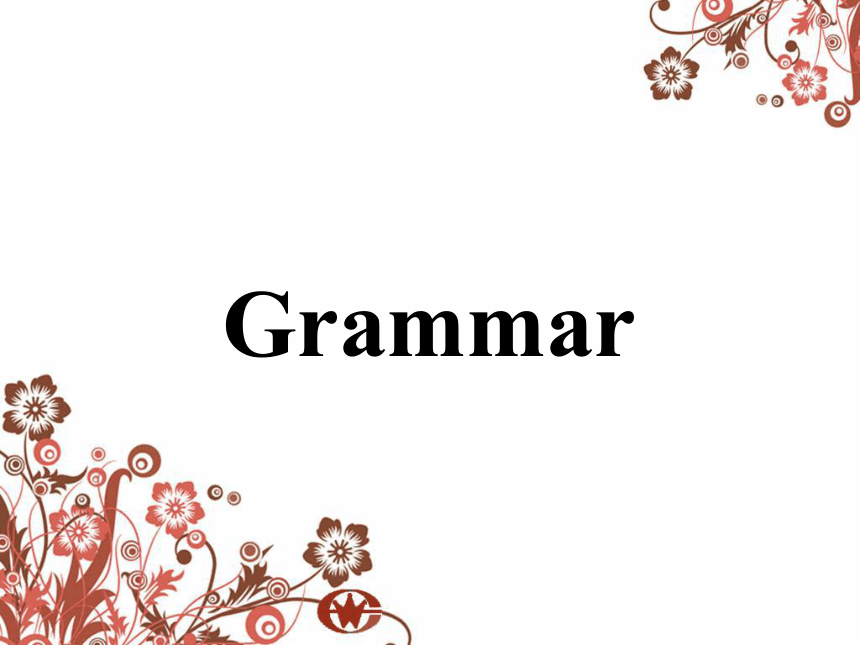
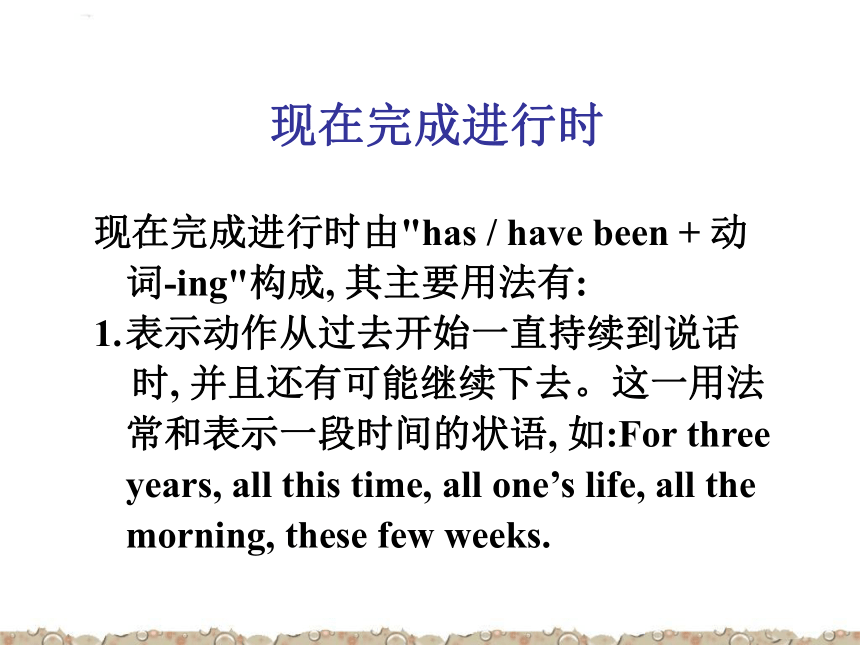
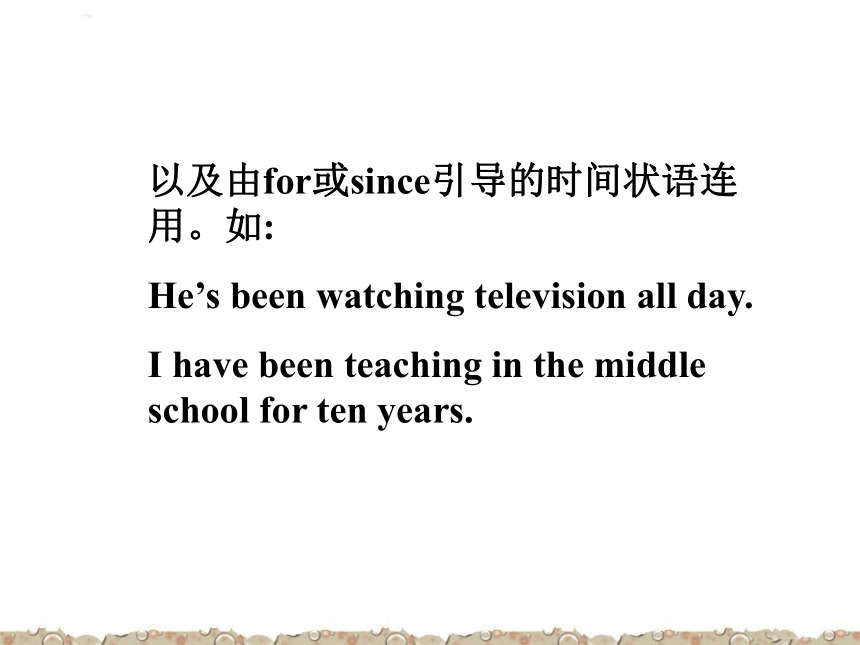
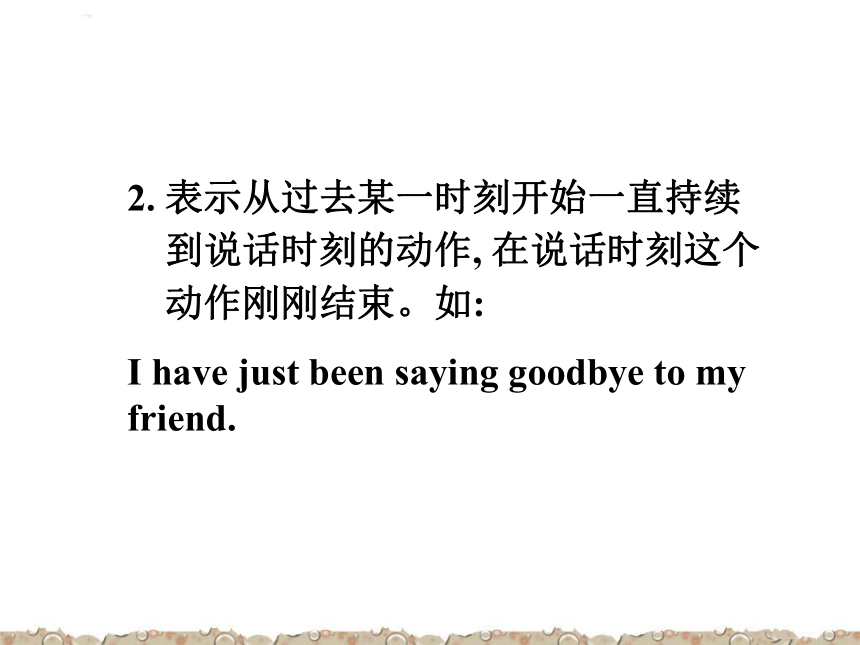
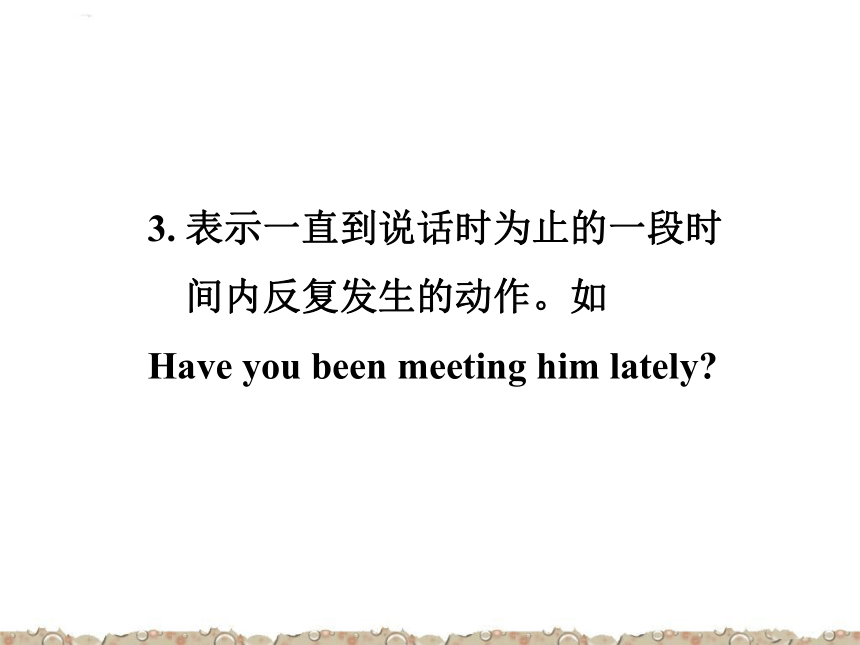
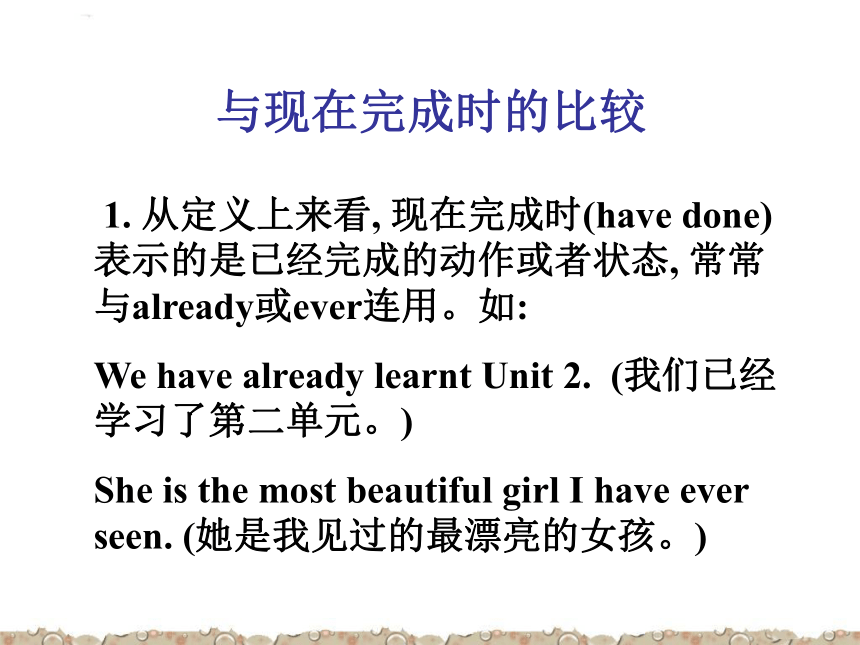
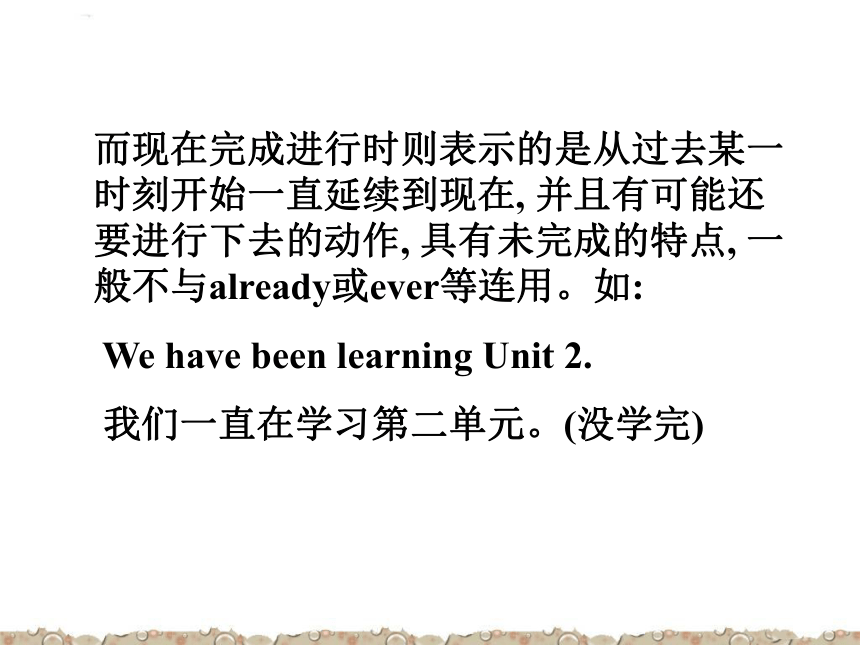
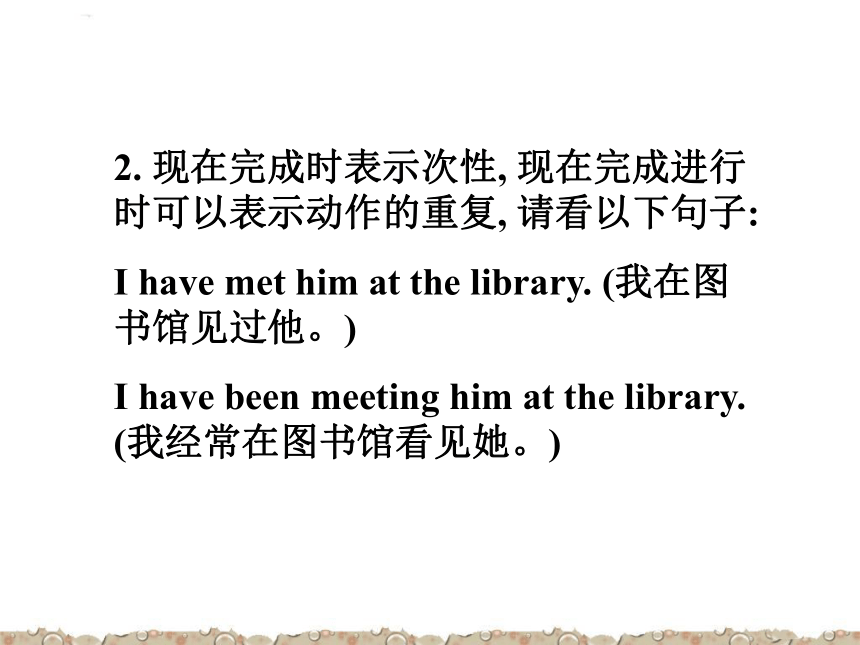
文档简介
课件29张PPT。Module 4
MusicGrammar 现在完成进行时 现在完成进行时由"has / have been + 动词-ing"构成, 其主要用法有:
表示动作从过去开始一直持续到说话
时, 并且还有可能继续下去。这一用法常和表示一段时间的状语, 如:For three years, all this time, all one’s life, all the morning, these few weeks. 以及由for或since引导的时间状语连用。如:
He’s been watching television all day.
I have been teaching in the middle school for ten years. 2. 表示从过去某一时刻开始一直持续
到说话时刻的动作, 在说话时刻这个
动作刚刚结束。如:
I have just been saying goodbye to my friend. 3. 表示一直到说话时为止的一段时
间内反复发生的动作。如
Have you been meeting him lately?与现在完成时的比较 1. 从定义上来看, 现在完成时(have done)表示的是已经完成的动作或者状态, 常常与already或ever连用。如:
We have already learnt Unit 2. (我们已经学习了第二单元。)
She is the most beautiful girl I have ever seen. (她是我见过的最漂亮的女孩。)而现在完成进行时则表示的是从过去某一时刻开始一直延续到现在, 并且有可能还要进行下去的动作, 具有未完成的特点, 一般不与already或ever等连用。如:
We have been learning Unit 2.
我们一直在学习第二单元。(没学完)2. 现在完成时表示次性, 现在完成进行时可以表示动作的重复, 请看以下句子:
I have met him at the library. (我在图书馆见过他。)
I have been meeting him at the library. (我经常在图书馆看见她。)3. 现在完成时和现在完成进行时都可以表示刚刚结束的动作, 但在含上有区别。现在完成时强调的是动作的结果, 而现在完成进行时强调的则是动作的过程。如:
We are very tired. We’ve been cleaning the house. 我们很累, 我们一直在打扫房子。
(强调动作)
We’ve cleaned the house. You may come in now. 我们打扫过房子了, 你可以进来了。
(强调结果"房子干净")4. 现在完成时通常只陈述事实, 而现在完成进行时还可表示一种感彩。如:
I have waited for two hours.我等了两个小时。(陈述事实)
I have been waiting for two hours.我等了两个小时。(等得好辛苦) 5. 现在完成进行时通常用来谈论较短暂的动作或情况;若要谈论时间延续较长的动作或情况或永久性情况, 则通常用现在完成时。如:
He has lived in Paris. 他(一直)住在巴黎。
He has been living in Paris. 他(目前)住在巴黎。(表暂时性) 6. 不用于进行时态的动词通常也不用于现在完成进行时, 但它们可以用于现在完成时。如:
I’ve only known her for two days. 我认识她刚刚两天。
They’ve been married for twenty years. 他们结婚已二十年了。
The war has lasted for a long time. 这场战争已经持续了很长时间。 7. 现在完成进行时不用于被动语态,若要用可用现在完成时的被动语态代替。如:
The house has been painted for a month. 这房子已漆了一个月。
The problem has been studied for five days. 这个问题已研究了五天。 Complete the conversation. Put the verbs into the present perfect progressive.have you been doinghave been givingbeen playinghave been playingbeen doinghave been learningComplete the passage with the correct forms of the verbs.Last night, I ______ (went / have been) to see a concert by the Chinese-born Canadian artist Liu Fang. She was born in China and ________ (studied / has been studying) music in Shanghai, but she _______________ (lived / has been living) in Canada since 1996. wentstudiedhas been livingShe ________________ (played / has been playing) traditional Chinese music since she was very young. Last night, she __________ (performed / has performed) a series of classical Chinese pieces for the pipa and the guzheng. I _______ (bought / have bought) a CD of her music after the concert and I ____________________ (listened / have been listening) to it all day today!has been playingperformedboughthave been listeningChoose the correct way to complete the sentences.1. She ______ jazz in New York since 2003.
has been studying
studied A2. My grandmother ______ dancing all her life: whenever I hear the 1940s dance music I think of her.
A. has been liking
B. likedB3. Jane _____ in Shanghai since 2001, but she still can’t speak Chinese.
lived
has been living B4. People _______ music for thousands of years.
A. have been playing
B. played A5. The top string broke on my lute and I _______ to repair it since this morning.
tried
have been trying B高考链接----We’ve spent too much money recently.
----Well, it isn’t surprising. Our friend and relatives _______around all the time.
A. are coming B. had come
C. were coming D. have been comingDI'm tired out. I _____ all afternoon and I don't seem to have finished anything.
A. shopped
B. have shopped
C. had shopped
D. have been shoppingDMother wanted to be a good provider, a role she ______ since her marriage to Father.
A. shoulders
B. shouldered
C. is shouldering
D. has been shoulderingDWe _____ on this project for four hours. Let’s have a rest.
A. are working
B. have been working
C. worked
D. had workedB—Why, Jack, you look so tired!
—Well, I _____the house and I must finish the work tomorrow.
A. was painting
B. will be painting
C. have painted
D. have been paintingDI have to see the doctor because I ____ a lot lately.
A. have been coughing
B. had coughed
C. coughed
D. coughAJoseph ______ to evening classes since last month, but he still can’t say “What’s your name?” in Russian.
A. has been going
B. went
C. goes
D. has goneA
MusicGrammar 现在完成进行时 现在完成进行时由"has / have been + 动词-ing"构成, 其主要用法有:
表示动作从过去开始一直持续到说话
时, 并且还有可能继续下去。这一用法常和表示一段时间的状语, 如:For three years, all this time, all one’s life, all the morning, these few weeks. 以及由for或since引导的时间状语连用。如:
He’s been watching television all day.
I have been teaching in the middle school for ten years. 2. 表示从过去某一时刻开始一直持续
到说话时刻的动作, 在说话时刻这个
动作刚刚结束。如:
I have just been saying goodbye to my friend. 3. 表示一直到说话时为止的一段时
间内反复发生的动作。如
Have you been meeting him lately?与现在完成时的比较 1. 从定义上来看, 现在完成时(have done)表示的是已经完成的动作或者状态, 常常与already或ever连用。如:
We have already learnt Unit 2. (我们已经学习了第二单元。)
She is the most beautiful girl I have ever seen. (她是我见过的最漂亮的女孩。)而现在完成进行时则表示的是从过去某一时刻开始一直延续到现在, 并且有可能还要进行下去的动作, 具有未完成的特点, 一般不与already或ever等连用。如:
We have been learning Unit 2.
我们一直在学习第二单元。(没学完)2. 现在完成时表示次性, 现在完成进行时可以表示动作的重复, 请看以下句子:
I have met him at the library. (我在图书馆见过他。)
I have been meeting him at the library. (我经常在图书馆看见她。)3. 现在完成时和现在完成进行时都可以表示刚刚结束的动作, 但在含上有区别。现在完成时强调的是动作的结果, 而现在完成进行时强调的则是动作的过程。如:
We are very tired. We’ve been cleaning the house. 我们很累, 我们一直在打扫房子。
(强调动作)
We’ve cleaned the house. You may come in now. 我们打扫过房子了, 你可以进来了。
(强调结果"房子干净")4. 现在完成时通常只陈述事实, 而现在完成进行时还可表示一种感彩。如:
I have waited for two hours.我等了两个小时。(陈述事实)
I have been waiting for two hours.我等了两个小时。(等得好辛苦) 5. 现在完成进行时通常用来谈论较短暂的动作或情况;若要谈论时间延续较长的动作或情况或永久性情况, 则通常用现在完成时。如:
He has lived in Paris. 他(一直)住在巴黎。
He has been living in Paris. 他(目前)住在巴黎。(表暂时性) 6. 不用于进行时态的动词通常也不用于现在完成进行时, 但它们可以用于现在完成时。如:
I’ve only known her for two days. 我认识她刚刚两天。
They’ve been married for twenty years. 他们结婚已二十年了。
The war has lasted for a long time. 这场战争已经持续了很长时间。 7. 现在完成进行时不用于被动语态,若要用可用现在完成时的被动语态代替。如:
The house has been painted for a month. 这房子已漆了一个月。
The problem has been studied for five days. 这个问题已研究了五天。 Complete the conversation. Put the verbs into the present perfect progressive.have you been doinghave been givingbeen playinghave been playingbeen doinghave been learningComplete the passage with the correct forms of the verbs.Last night, I ______ (went / have been) to see a concert by the Chinese-born Canadian artist Liu Fang. She was born in China and ________ (studied / has been studying) music in Shanghai, but she _______________ (lived / has been living) in Canada since 1996. wentstudiedhas been livingShe ________________ (played / has been playing) traditional Chinese music since she was very young. Last night, she __________ (performed / has performed) a series of classical Chinese pieces for the pipa and the guzheng. I _______ (bought / have bought) a CD of her music after the concert and I ____________________ (listened / have been listening) to it all day today!has been playingperformedboughthave been listeningChoose the correct way to complete the sentences.1. She ______ jazz in New York since 2003.
has been studying
studied A2. My grandmother ______ dancing all her life: whenever I hear the 1940s dance music I think of her.
A. has been liking
B. likedB3. Jane _____ in Shanghai since 2001, but she still can’t speak Chinese.
lived
has been living B4. People _______ music for thousands of years.
A. have been playing
B. played A5. The top string broke on my lute and I _______ to repair it since this morning.
tried
have been trying B高考链接----We’ve spent too much money recently.
----Well, it isn’t surprising. Our friend and relatives _______around all the time.
A. are coming B. had come
C. were coming D. have been comingDI'm tired out. I _____ all afternoon and I don't seem to have finished anything.
A. shopped
B. have shopped
C. had shopped
D. have been shoppingDMother wanted to be a good provider, a role she ______ since her marriage to Father.
A. shoulders
B. shouldered
C. is shouldering
D. has been shoulderingDWe _____ on this project for four hours. Let’s have a rest.
A. are working
B. have been working
C. worked
D. had workedB—Why, Jack, you look so tired!
—Well, I _____the house and I must finish the work tomorrow.
A. was painting
B. will be painting
C. have painted
D. have been paintingDI have to see the doctor because I ____ a lot lately.
A. have been coughing
B. had coughed
C. coughed
D. coughAJoseph ______ to evening classes since last month, but he still can’t say “What’s your name?” in Russian.
A. has been going
B. went
C. goes
D. has goneA
